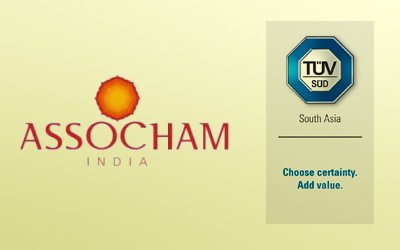Inside BENEO’s new pulse plant: pioneering sustainable protein from faba beans
“If India is to compete in the food sector in the world, food safety is important. And quality and safety give competitive edge in the food industry, particularly while promoting exports adhering to internationally accepted food standards,” said Tariq Anwar, union minister of state for agriculture & food processing and industries. He was speaking after inaugurating a day long summit on food safety on the theme ‘safe future now’ organised jointly by Associated Chambers of Commerce and Industry of India (ASSOCHAM) and TUV SUD, South Asia in Gurgaon recently.
Speaking at the inaugural function, Siraj Hussain, union secretary of ministry of food processing and industries, said that regulations were stringent and the FSSAI felt that industry was not doing the way it was suppose to be done. There was need for achieving the balance in this regard.
Dr Ing Axel Stepken, Chairman of the Board of Management, TÜV SÜD AG said, “decreasing levels of water would affect food industry.” B Venkataraman, secretary general, Quality Council of India, said safe food should be assured to all as it was right of everyone. Dr S K Saxena, Director, Export Council of India, made a presentation on Regulatory Landscape of India. Niranjan Nadkarni, CEO, TUV SUD South Asia, welcomed the guests while D S Rawat, Secretary General, ASSOCHAM proposed vote of thanks.
The day long summit witnessed three panel discussions on the theme ‘globalisation, food safety challenges and the role of regulations in shaping the Indian food industry’, ‘optimising supply chain processes and systems for safer business’ and ‘effective implementation of new age strategy, to safeguard consumer’s interest and enhance company’s reputation’.
Participating in discussion on globalization, Anil Jauhri, CEO, National Accreditation Board for Certification Bodies, said one major lacuna in all our regulations is that we never put onus on industry for showing compliance. But this lacuna is removed in Food Safety and Standards Act. Inspection regime cannot ensure food safety and self-regulation was important. Prabodh Halde, Technical head (Regulatory), Marico, pointed out that food industry will play important role in strengthening economy. Navneet Mehta, Director, Eurasia Analytical Service Centre, Coca Cola India, said like BPO revolution in 80s and 90s now there was opportunity for food labs as India can test food at low coast.
Besides, Shaminder Pal Singh, Director, scientific & regulatory affairs, PepsiCo India, Dr K L Gaba, Chairman (Technical & feed regulatory affairs committee), All India Food Processors Association and Dr Ing Axel Stepken, Chairman of the board of management, TUV SUD AG, participated in the discussion which was moderated by Kumar Ketkar, chief editor of Divya Marathi.
In the discussion on supply chain processes, Dr PrabhakarKanade, chief R & D officer, Mother Dairy Fruits and Vegetables said middlemen should be out of the system then only contamination of milk can be eliminated. On technical front, he said rapid milk chiller was being developed. Partha Gangopadhyay, Director-Operations and supply chain (India), Wrigley India, said two major challenges were expectations of consumers and price points as Indian consumer was price sensitive. Ishan Palit, CEO, TUV SUD product service division, said the companies were reactive enough and they respond to the changes.
Maharaj Pandita, regional director, technical operations – India, Abbot Nutrition International and T Srinivasan, Vice president – Corporate quality, PepsiCo India, also participated in the discussion. It was moderated by Dr Debadyuti Das, associate professor, faculty management studies, Delhi.
In the third discussion, Max Hegerman, marketing director, Edelmanm Digital, said that consumers need transparency. Samir Kuckreja, President, National Restaurant Association of India, said monitoring social media was very important. Knowing what was happening to your brand and responding immediately was very crucial. He pointed out that accepting the problem and showing to the consumer what you were doing about it was very important. The organisation should take concrete action visible to consumers, he said and added that consumers are a great sources of ideas, so listen to them and perhaps reward them.
Deeba Rajpal, freelance food writer and blogger, moderated the discussion on the new age strategy and others who participated included Krishi Arora, chief, foodaholics, and Liz Fendt, vice –president, international marketing, TUV SUD.

